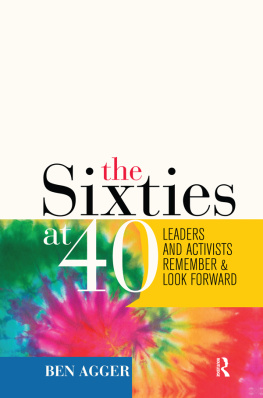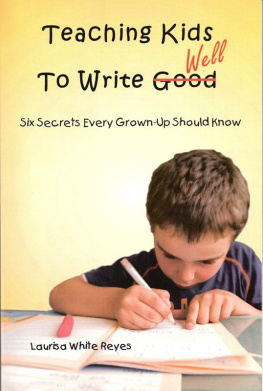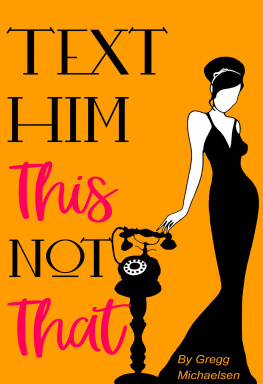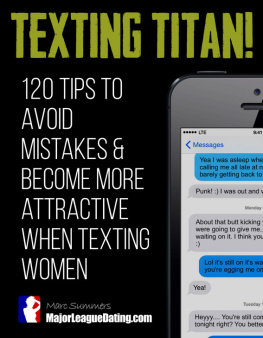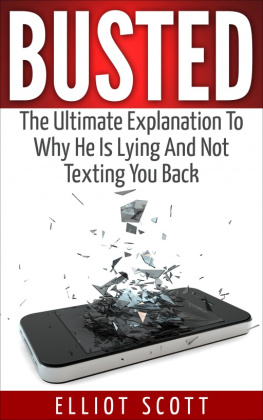First published 2013 by Paradigm Publishers
Published 2016 by Routledge
2 Park Square, Milton Park, Abingdon, Oxon OX14 4RN
711 Third Avenue, New York, NY 10017, USA
Routledge is an imprint of the Taylor & Francis Group, an informa business
Copyright 2013, Taylor & Francis.
All rights reserved. No part of this book may be reprinted or reproduced or utilised in any form or by any electronic, mechanical, or other means, now known or hereafter invented, including photocopying and recording, or in any information storage or retrieval system, without permission in writing from the publishers.
Notice:
Product or corporate names may be trademarks or registered trademarks, and are used only for identification and explanation without intent to infringe.
Library of Congress Cataloging-in-Publication Data
Agger, Ben.
Texting toward Utopia: kids, writing, and resistance / Ben Agger.
pages cm
Includes bibliographical references and index.
ISBN 978-1-61205-308-0 (pbk.: alk. paper)
ISBN 978-1-315-63164-6 (eBook)
1. Internet and youth. 2. Text messaging (Cell phone systems) 3. Computers and
literacy. I. Title.
HQ799.9.I58A35 2013
004.67'80835dc23
2013011453
ISBN 13: 978-1-61205-308-0 (pbk)
ISBN 13: 978-1-61205-307-3 (hbk)
Several years ago, when I began this book, the working title was Blogging toward Utopia. And then texting happened, and I updated my technological metaphor. That makes me wonder whether we will still have Facebook, or even the Internet, in ten years. I think we will have the Internet or some other global technology of electronic communication and information. Yet one must be cautious about reifying technologies that are here today but gone tomorrow.
Nevertheless, there is no going back; we cannot put the genie of pixelated communication back in the bottle. The Internet and smartphones separate the modern and postmodern, although we carry forward aspects of modernity such as capitalism and its culture industries. Much as I began to do in my book Postponing the Postmodern, I continue to reckon with the shifting boundaries between modernity and postmodernityin this book, with particular reference to children and writing. One of my conclusions is that we are all children in the sense that we are all needy and not fully formed. Everyone requires a parent, which is to say that we need a solid and stable mooring in a world that doesnt change too quickly. And we need to be loved.
If all writing is autobiography, it is perhaps worth noting that I began to think about such issues when my kids were still in high school. I published an article presaging this book: Text Messages: Reading Kids Writing Politically (2009b). Since I began writing about fast capitalism more than twenty years ago, I have been interested in the ways that discourses such as science conceal their literary naturethe fact that they have been authoredand do not simply reflect nature. Concealment usually takes place under the guise of methodology, which is a cleansing exercise. I call writing that conceals its literariness secret writing. Kids writing, such as texting and Facebook posting, confesses its literary character; if anything, it overshares. Oversharing is interesting in its own right; it reflects the fact that people are alone and seek connection, even if they dont always choose the best means to connect. Almost like an anthropologist from Mars, I have observed my scientific colleagues write this way (and then conceal it). All secret writing can be read as the authored act it was. But to suggest that writing proceeds from literary perspective does not rob it of validity; all writing tells the truth, even when it falsifies or conceals.
I have learned from my kids and their friends that this is the most literary of ages and that they have a lot to say. But just as positivists dont consider science to be writing, many judgmental adults view texting and Facebook as too chatty to be writing. For them, writing lies in a narrow band of literary expression within which we can find Shakespeare and Robert Frost. The Martian anthropologist learns not to be condescending but to immerse himself in the world as he finds it. I hope that this book embodies respect for and empathy with my research subjects, the kids who check their phones before, during, and after my lectures but who can multitask, paying attention while checking over their shoulders electronically. We are not different; members of my generation were young once.
This is all late-breaking news. As I was preparing my final manuscript, the Chronicle of Higher Education (May 1, 2013) ran a story by Dan Berrett entitled Students May Be Really Reading, But Not for Class. He reports on recent research by some Texas education faculty at Midwestern State University (SuHua Huang, Phillip Jeffrey Blacklock, and Matthew Capps) on college student reading habits. They find that 40 percent of what students read (sometimes during class time) is from social media, if not always from their college textbooks. My own experience is that students move back and forth fluently between Internet reading and pulp reading, documenting their term papers with citations from both media. It may be unnerving for pre-Internet faculty to observe their students poring over phones, tablets, and laptops, but this is literary activity and all literary activity is goodfor the soul and for democracy.
This book responds to the fact that there is a great deal of psychic distress in the land. School shootings and youth suicide are but two manifestations of this. Many adults are miserable, too, and they either pass on their misery to their kids or fail to nurture them sufficiently because they are dealing with their own demons. Repeatedly, here as elsewhere, I call for slowing things down, working against the tide of fast capitalism. I call this slowmodernity, signifying a blending of what is good about the modern, postmodern, and pre-modern. And I address the roles that people can play in achieving that slowmodernity, including how we write and form community.
I am enough of a Marxist to believe that the manifestations of psychic distress, as well as the loss of face-to-face community, are structural outcomes. To fix particular things such as schooling and childrens diets, we must fix the totality. Band-aids dont work. And yet we cannot change structures without simultaneously changing the particular ways we live our lives in the present. People make choices, and can make better ones, even though choice is constrained by structure. Films such as Forks over Knives demonstrate how switching from meat-based to plant-based protein can change the world, one life at a time. Changing childhood and schooling can likewise have an enormous impact on overall social and economic structures, in effect creating new sensibilities, as Marcuse called them in his 1969 manifesto An Essay on Liberation. And these new selves can and do form and join social movements such as Occupy, provoking certain authoritarian responses from those who have a lot to lose when youth [are] in revolt (Giroux 2012).


